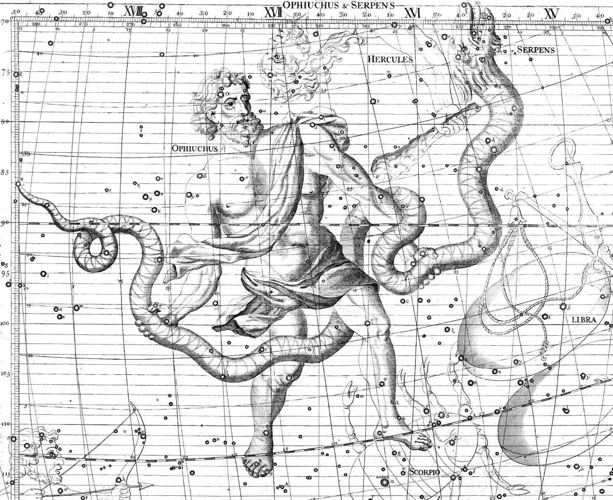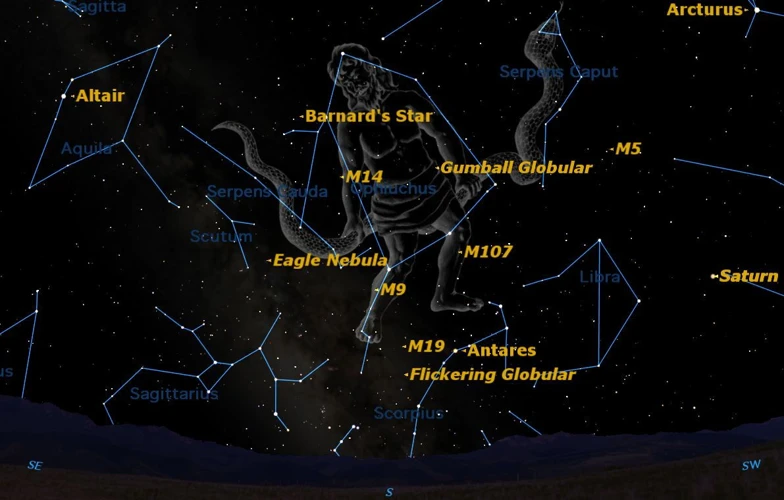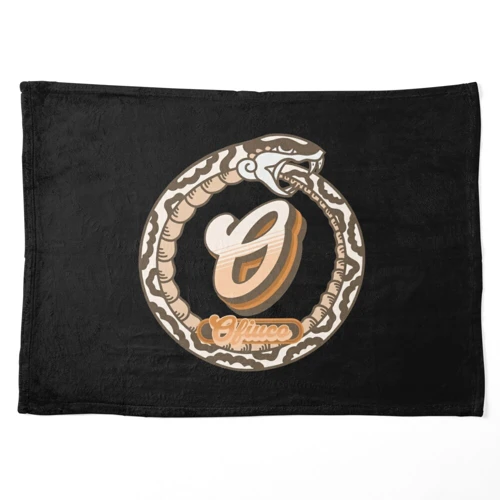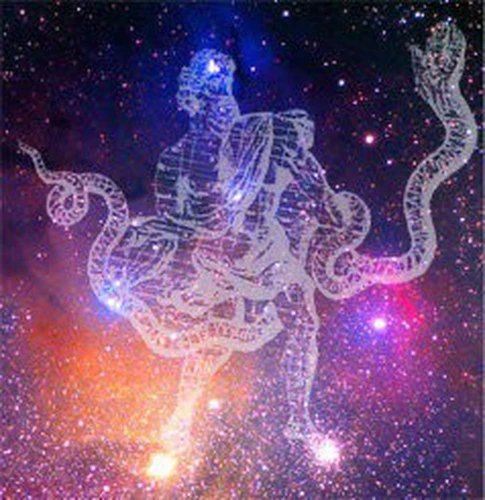Have you ever heard of Ophiuchus? Despite being lesser-known, Ophiuchus holds a fascinating place in mythology and symbolism. This enigmatic figure has origins in both Greek and Babylonian mythology, where he is associated with healing and guardianship. Ophiuchus is represented by a man holding a serpent, symbolizing his connection to wisdom and serpentine power. Surprisingly, Ophiuchus was once considered a part of the zodiac, but it has since been forgotten by many. In this article, we will delve into the captivating tales and meanings behind the elusive Ophiuchus, shedding light on a fascinating aspect of ancient lore.
Contents
- The Origin of Ophiuchus
- The Symbolism of Ophiuchus
- Ophiuchus in Astrology
- The Forgotten Zodiac Sign
- Conclusion
-
Frequently Asked Questions
- 1. Who is Ophiuchus in Greek mythology?
- 2. What is the symbolism behind Ophiuchus?
- 3. What is the story of Ophiuchus and the serpent?
- 4. Is Ophiuchus considered a part of the zodiac?
- 5. Why was Ophiuchus dropped from the zodiac?
- 6. What are some traits associated with Ophiuchus?
- 7. Are there horoscopes for Ophiuchus?
- 8. What modern interest is there in Ophiuchus?
- 9. How does Ophiuchus relate to other zodiac signs?
- 10. Can Ophiuchus be included in personal astrological readings?
- References
-
Frequently Asked Questions
- 1. What is Ophiuchus, and why is it considered a lesser-known constellation?
- 2. What is the origin of Ophiuchus in mythology?
- 3. What role does Ophiuchus play in Greek mythology?
- 4. How is Ophiuchus depicted in Babylonian mythology?
- 5. What are the symbolic representations of Ophiuchus?
- 6. How is Ophiuchus seen as a healer?
- 7. What is the significance of Ophiuchus as a guardian?
- 8. Why are serpents commonly associated with Ophiuchus?
- 9. How does Ophiuchus factor into astrology?
- 10. Why was Ophiuchus dropped from the traditional zodiac?
- References
- Read More
The Origin of Ophiuchus

The origin of Ophiuchus can be traced back to ancient Greek and Babylonian mythology, where this figure played a significant role. In Greek mythology, Ophiuchus is associated with the legendary healer Asclepius, who possessed remarkable abilities to restore health and even bring the dead back to life. It is said that the symbol of Ophiuchus, a man holding a serpent, represents Asclepius’s pivotal encounter with a snake that taught him the secret knowledge of healing. In Babylonian mythology, Ophiuchus is linked to the god Enki, who was revered as a divine figure with immense wisdom and knowledge. Enki’s association with serpents further emphasized the symbolism and connection to healing and enlightenment. The stories of Ophiuchus highlight the deep-rooted belief in the power of healing and the significance of serpents in ancient cultures.
If you’re interested in exploring more about the origins of various mythological figures and their connections to astrology, you can check out our article on mythology and zodiac constellations.
Ophiuchus in Greek Mythology
In Greek mythology, Ophiuchus holds a significant role as the symbol for the legendary healer Asclepius. Asclepius was the son of Apollo, the god of healing and medicine, and Coronis, a mortal princess. He possessed exceptional healing powers, which enabled him to revive the dead and cure the most incurable diseases. Legend has it that Asclepius’s connection to Ophiuchus stemmed from a pivotal event in his life. One day, Asclepius witnessed a snake slithering toward him, carrying a herb in its mouth. Curious, the snake placed the herb on a dead snake, reviving it to life. Impressed by the snake’s healing abilities, Asclepius took this as a sign and began to study the art of medicine and healing. It is said that the symbol of Ophiuchus, a man holding a serpent, represents Asclepius’s encounter with the snake and his subsequent mastery of the serpent’s wisdom. This association between Ophiuchus and healing became so significant that Asclepius himself was often depicted with the serpent coiled around a staff, a symbol known as the Rod of Asclepius, which is still commonly used in the medical field today. The tales of Ophiuchus in Greek mythology highlight the profound belief in the power of healing and the divine connection between humanity and the healing arts.
If you’re interested in delving deeper into fascinating ancient civilizations and their mythologies, you can explore our article on the rise and fall of the Minoan civilization.
Ophiuchus in Babylonian Mythology
In Babylonian mythology, Ophiuchus holds a significant place as the embodiment of the god Enki. Enki, also known as Ea, was one of the most revered deities of the Babylonian pantheon, associated with wisdom, magic, and the arts. Ophiuchus symbolizes the divine wisdom and knowledge possessed by Enki. The representation of Ophiuchus as a man holding a serpent further emphasizes the connection between Enki and serpentine power, as serpents were considered divine creatures in Babylonian culture. The serpent is also associated with healing and rejuvenation, which aligns with Enki’s role as a god of healing. This Babylonian mythological figure highlights the profound influence of serpents and their symbolism in ancient civilizations.
To explore more about the sacred animals and their significance in Native American mythology, take a look at our article on sacred animals in Native American mythology.
The Symbolism of Ophiuchus

The symbolism of Ophiuchus is multifaceted and captivating. One significant aspect of Ophiuchus is its representation as a healer. In Greek mythology, Ophiuchus is equated with Asclepius, the god of medicine and healing. This association highlights Ophiuchus’s role as a symbol of hope and restoration, embodying the power to bring health and well-being to those in need. Additionally, Ophiuchus is often depicted as a guardian, showcasing its protective nature. This symbolizes Ophiuchus’s dedication to safeguarding and guiding others on their journeys. The serpent plays a crucial role in Ophiuchus’s symbolism. The serpent, typically coiled around the figure, signifies wisdom, transformation, and rebirth. It serves as a reminder of Ophiuchus’s connection to ancient knowledge and the spiritual realm. The symbolism of Ophiuchus is rich and layered, inviting us to explore its diverse meanings and embrace its profound significance.
Ophiuchus as a Healer
Ophiuchus is widely recognized as a symbol of healing and medicine in various mythologies. In Greek mythology, Ophiuchus is associated with Asclepius, the renowned healer and son of Apollo. Asclepius had the ability to restore health and even resurrect the dead. It is said that he learned the art of healing from a snake, which is why Ophiuchus is depicted holding a serpent in his hands. This symbolizes the knowledge and wisdom he gained from the serpent, which became the foundation of his extraordinary healing powers.
Similarly, in Babylonian mythology, Ophiuchus is linked to the god Enki, who was revered as a god of wisdom and knowledge. Enki’s association with healing and medicine further reinforces the role of Ophiuchus as a symbol of healing. The serpent, a key aspect of the Ophiuchus symbol, represents the shedding of old skin and renewal, aligning with the transformative nature of healing.
The symbolism of Ophiuchus as a healer extends beyond ancient mythologies. Today, Ophiuchus is often associated with alternative healing practices and holistic medicine. Those born under the Ophiuchus sign are believed to possess intuitive healing abilities and a natural inclination towards caring for others. The image of Ophiuchus as a healer serves as a reminder of the power of healing and the importance of nurturing the mind, body, and spirit.
Ophiuchus’s representation as a healer in various mythologies and its continued significance in contemporary beliefs highlight the enduring fascination with the power of healing and the noble role of healers in society.
Ophiuchus as a Guardian
Ophiuchus, in addition to his role as a healer, is also often portrayed as a guardian figure. Ophiuchus’s association with protection and guardianship stems from his role in Greek mythology as the father of numerous children, particularly notable for his sons, Agamedes and Trophonius. These twin brothers were renowned as skilled architects and craftsmen who designed and built strategic fortifications and temples. Ophiuchus’s paternal guidance and wisdom influenced his sons’ abilities and their dedication to safeguarding sacred spaces and structures.
Ophiuchus’s connection to guardianship can be seen in his depiction as a man grasping a serpent. This image symbolizes his control and command over serpentine forces, suggesting his ability to ward off danger and protect against malevolent influences. The serpent, often associated with transformation and hidden knowledge, represents Ophiuchus’s role as a guardian of esoteric wisdom and secrets.
In various cultures and mythologies, guardian figures play a crucial role in ensuring the safety and well-being of individuals, communities, and sacred spaces. Ophiuchus embodies this archetype as a celestial guardian, offering protection and guidance to those in need.
For more insights into different mythologies and their representation of guardian figures, you can explore our article on sacred animals in Native American mythology.
Ophiuchus and Serpents
Ophiuchus and serpents have a deep and intriguing connection that spans across different mythologies and cultures. In Greek mythology, Ophiuchus is often associated with the healing god Asclepius, who is depicted holding a staff with a serpent wrapped around it – the caduceus. This symbol has become synonymous with the medical profession today. The serpent represents wisdom, rebirth, and transformation, and its presence in the emblem of Asclepius signifies the healing powers associated with Ophiuchus.
Similarly, in Babylonian mythology, Ophiuchus is linked to the god Enki, who is often depicted with two entwined serpents. These serpents symbolize the duality of life and death, as well as the ability to navigate between the physical and spiritual realms. The serpents in both Greek and Babylonian mythologies represent the latent power and knowledge that Ophiuchus possesses.
Interestingly, the association between Ophiuchus and serpents extends beyond mythology and into other cultures as well. For example, in Native American mythology, serpents are often revered as sacred creatures with strong spiritual connections. They are seen as symbols of transformation, healing, and protection. The intertwining of Ophiuchus with serpents in different mythologies highlights the enduring symbolism of these creatures and their association with wisdom, healing, and spiritual growth.
The intricate relationship between Ophiuchus and serpents showcases the significance of these enchanting creatures in various mythologies and belief systems. Their presence further emphasizes the mystical and profound nature of Ophiuchus, making this lesser-known constellation and its associated symbolism all the more captivating.
Ophiuchus in Astrology

Ophiuchus in astrology is a topic that has sparked intrigue and curiosity among enthusiasts. However, it is important to note that although Ophiuchus was once considered a part of the zodiac, it is not recognized as an official zodiac sign in mainstream astrology today. The zodiac we are familiar with consists of twelve signs, each representing different personality traits and characteristics. Ophiuchus, often referred to as the “13th zodiac sign,” falls between Scorpio and Sagittarius in the ecliptic, but its inclusion would require a major restructuring of the zodiac system.
Despite not being officially recognized, some individuals still incorporate Ophiuchus into their astrological practices. Those born around November 29th to December 17th may identify as Ophiuchus and attribute characteristics such as wisdom, healing abilities, and a deep connection to nature to their astrological profile. Additionally, some astrologers believe that Ophiuchus may exhibit traits of both Scorpio and Sagittarius or possess unique qualities not found in other zodiac signs.
The interest in Ophiuchus in astrology can be attributed to the continuous search for self-discovery and a desire to explore alternative perspectives. Whether one views Ophiuchus as a valid zodiac sign or not, its existence raises fascinating questions about the complexity of astrology and the potential influence of lesser-known constellations on our lives.
If you’re intrigued by the intersection of mythology and astrology, you may also want to read our article on how astrology has influenced various cultures throughout history, including the rise and fall of the Minoan civilization. You can find it here: The Rise and Fall of the Minoan Civilization.
The Forgotten Zodiac Sign

One intriguing aspect of Ophiuchus is that it was once considered a part of the zodiac, but it has been largely forgotten by many. Ophiuchus, also known as the Serpent Bearer, was originally positioned between Scorpius and Sagittarius on the zodiac wheel. However, this enigmatic sign was eventually dropped from the zodiac system, leaving behind only the familiar twelve signs that we recognize today. The reasons for Ophiuchus being excluded from the zodiac are varied and complex. Some explanations point to the difficulty of fitting a 13th sign into the 12-month calendar, while others suggest that the decision was influenced by the symbolic significance of the number 12 in various mythologies and cultures. Regardless of the reasons, the omission of Ophiuchus from the zodiac has fueled curiosity, and there has been a resurgence of interest in this forgotten sign in recent years.
Why Ophiuchus Was Dropped
Why was Ophiuchus dropped from the zodiac? The answer lies in the history and development of astrology. Traditionally, the zodiac consisted of twelve astrological signs that were aligned with the twelve constellations along the ecliptic, the apparent path of the Sun across the sky. However, due to a phenomenon known as precession, the Earth’s rotation axis slowly shifts over time, causing the position of the constellations to change. This led to the realization that there is actually a thirteenth constellation that crosses the ecliptic, Ophiuchus.
The inclusion of Ophiuchus in the zodiac poses a practical problem. In order to maintain the twelve equal divisions of the zodiac, each sign would have to be shortened to accommodate this extra constellation, disrupting the established system. As a result, Ophiuchus was ultimately dropped from the zodiac. However, it’s important to note that astrology is a human-created system and subject to interpretation and adaptation.
Despite being dropped from the zodiac, there has been a resurgence of interest in Ophiuchus in recent years. Many people find themselves relating more to the traits and characteristics attributed to Ophiuchus, leading them to consider themselves as belonging to this “forgotten” sign. Additionally, the rise of social media and online astrology discussions have sparked conversations about the potential inclusion of Ophiuchus in astrological practices. While the official astrological system may not recognize Ophiuchus, its presence continues to captivate the imagination and intrigue astrology enthusiasts worldwide.
Modern Interest in Ophiuchus
In recent years, there has been a growing interest in Ophiuchus among astrology enthusiasts and individuals curious about the lesser-known zodiac sign. The sudden surge in modern interest can be attributed to various factors. One major catalyst has been the widespread availability of information on the internet, allowing people to explore and discover lesser-known aspects of astrology. Social media platforms and online communities have also played a significant role in popularizing Ophiuchus, with many discussions, memes, and articles dedicated to this intriguing zodiac sign. Additionally, some individuals feel a connection to Ophiuchus when they read about its symbolism as a healer and guardian, seeing themselves reflected in these qualities. Whether it’s a desire for exploration, a sense of identity, or a simple fascination with the unknown, the modern interest in Ophiuchus continues to grow and captivate those seeking a deeper understanding of astrology and its hidden gems.
Conclusion

In conclusion, the lesser-known Ophiuchus holds a fascinating place in mythology, symbolism, and even astrology. The stories of Ophiuchus in Greek and Babylonian mythology highlight the significance of this figure as a healer, guardian, and keeper of wisdom. His association with serpents further emphasizes the connection between healing and serpentine power. Although Ophiuchus was once considered a part of the zodiac, it has been largely forgotten in modern astrology. However, there has been a growing interest in Ophiuchus in recent years, with enthusiasts exploring its potential impact on astrological interpretations. The enigma of Ophiuchus serves as a reminder of the rich and complex tapestry of ancient lore and its enduring influence on our beliefs and perceptions. Whether it is delving into the fascinating myths surrounding Ophiuchus or exploring the zodiac constellations, there is no shortage of captivating tales to uncover. So, next time you gaze up at the night sky, take a moment to ponder the mysteries of the forgotten zodiac sign, Ophiuchus.
Frequently Asked Questions

1. Who is Ophiuchus in Greek mythology?
In Greek mythology, Ophiuchus is associated with the legendary healer Asclepius. He possessed extraordinary healing abilities and was known to have the power to bring the dead back to life.
2. What is the symbolism behind Ophiuchus?
Ophiuchus symbolizes healing and guardianship. As a healer, he represents the power to restore health and promote well-being. His association with serpents signifies wisdom, enlightenment, and the transformative power of serpentine energy.
3. What is the story of Ophiuchus and the serpent?
The story varies between Greek and Babylonian mythology. In Greek mythology, Ophiuchus encountered a serpent that taught him the secret knowledge of healing, while in Babylonian mythology, Ophiuchus is linked to the god Enki, who was associated with serpents and divine wisdom.
4. Is Ophiuchus considered a part of the zodiac?
Although Ophiuchus was once considered a part of the zodiac, it is now often excluded from the standard zodiac system that includes twelve signs.
5. Why was Ophiuchus dropped from the zodiac?
Ophiuchus was dropped from the zodiac system due to the 12-sign division that aligns with the 12 months of the year. This makes it challenging to accommodate an additional sign without rearranging the whole system.
6. What are some traits associated with Ophiuchus?
People born under the sign of Ophiuchus are believed to possess traits such as healing abilities, wisdom, empathy, intuition, and a deep connection to nature and spirituality.
7. Are there horoscopes for Ophiuchus?
While some astrologers recognize Ophiuchus as a sign and create horoscopes for it, it is not widely adopted in mainstream astrology.
8. What modern interest is there in Ophiuchus?
There has been a resurgence of interest in Ophiuchus in recent years, with some individuals identifying strongly with the traits and symbolism associated with this sign.
9. How does Ophiuchus relate to other zodiac signs?
Ophiuchus is said to be positioned between Scorpio and Sagittarius in the zodiac. It is often described as a sign with characteristics that bridge those of the two neighboring signs.
10. Can Ophiuchus be included in personal astrological readings?
For those who resonate with the symbolism and traits of Ophiuchus, astrologers can incorporate it into personal readings and interpretations, providing insights specific to this sign.
References
- Welcome to the Zodiac, Ophiuchus. But Who Are You?
- Ophiuchus, 13th constellation of Zodiac | Tonight
- Ophiuchus
Frequently Asked Questions

1. What is Ophiuchus, and why is it considered a lesser-known constellation?
Ophiuchus is a constellation located in the southern sky, known as the “Serpent Bearer” or “Snake Handler.” It is considered lesser-known because it is not part of the traditional zodiac, consisting of twelve signs.
2. What is the origin of Ophiuchus in mythology?
Ophiuchus has origins in both Greek and Babylonian mythology, symbolizing different aspects of healing and wisdom.
3. What role does Ophiuchus play in Greek mythology?
In Greek mythology, Ophiuchus is associated with the legendary healer Asclepius, who possessed the ability to bring the dead back to life.
4. How is Ophiuchus depicted in Babylonian mythology?
In Babylonian mythology, Ophiuchus is often associated with the god Ningishzida, who was believed to have the power to protect against evil and bring fertility to the land.
5. What are the symbolic representations of Ophiuchus?
Ophiuchus is commonly symbolized as a healer, a guardian, and a figure associated with serpents.
6. How is Ophiuchus seen as a healer?
Ophiuchus is seen as a healer due to its association with the Greek god Asclepius, who was revered for his ability to cure diseases and bring about healing.
7. What is the significance of Ophiuchus as a guardian?
Ophiuchus is often regarded as a guardian figure, believed to have the power to protect against evil forces and bring stability and harmony.
8. Why are serpents commonly associated with Ophiuchus?
Serpents are associated with Ophiuchus because they represent wisdom, transformation, and rebirth – qualities closely related to healing and the shedding of old ways.
9. How does Ophiuchus factor into astrology?
In astrology, Ophiuchus is considered the forgotten zodiac sign, as it was left out of the twelve-sign system. However, there has been a recent surge of interest in incorporating Ophiuchus into astrological interpretations.
10. Why was Ophiuchus dropped from the traditional zodiac?
Ophiuchus was dropped from the traditional zodiac due to the desire for symmetry and uniformity within the twelve-sign system.







